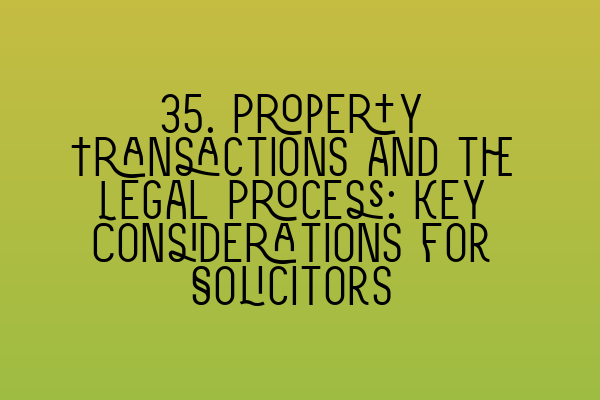35. Property Transactions and the Legal Process: Key Considerations for Solicitors
Property transactions can be complex and require the expertise of solicitors to navigate the legal process effectively. Whether you’re a first-time buyer or an experienced property investor, it is crucial to understand the key considerations involved in property transactions to ensure a smooth and successful transaction.
The Role of Solicitors in Property Transactions
Solicitors play a vital role in property transactions by providing legal advice and guidance to their clients. Their primary responsibilities include:
- Conducting property searches to identify any potential issues or restrictions
- Drafting or reviewing contracts and other legal documents
- Negotiating terms and conditions with the other party involved
- Handling the transfer of funds and ensuring all financial aspects are in order
- Registering the property with the relevant authority and ensuring all legal obligations are met
Given the complexities involved, it is essential for solicitors to possess a deep understanding of property law and stay updated with any changes to legislation.
Key Considerations for Solicitors in Property Transactions
While each property transaction is unique, there are several key considerations that solicitors should keep in mind:
1. Due Diligence
Thorough due diligence is crucial in property transactions to identify any potential issues, such as title defects, planning restrictions, or outstanding fees. Solicitors must conduct comprehensive property searches to obtain all relevant information and advise their clients accordingly.
2. Contractual Obligations
Solicitors are responsible for drafting or reviewing contracts and ensuring that all legal obligations are clearly defined. They should negotiate favorable terms and conditions for their clients, taking into account any specific requirements or concerns.
3. Financing and Mortgage Arrangements
Assisting clients with financing and mortgage arrangements is another critical aspect of a solicitor’s role. They should ensure that all financial aspects, including loan agreements and repayments, are properly documented and comply with legal requirements.
4. Stamp Duty Land Tax (SDLT)
Solicitors need to advise their clients on the appropriate payment of Stamp Duty Land Tax. They should calculate the correct amount payable, submit the necessary forms to HM Revenue & Customs, and facilitate the payment process.
5. Land Registration
Solicitors must handle the land registration process accurately and efficiently. This involves submitting the necessary applications and supporting documentation to the Land Registry, ensuring the property is adequately registered in the client’s name.
6. Additional Considerations
Other considerations that solicitors should address include leasehold or freehold ownership, property surveys, easements, covenants, and any potential environmental or planning issues. By conducting thorough research and due diligence, solicitors can ensure their clients are fully aware of any potential risks or ongoing obligations.
Overall, property transactions require meticulous attention to detail and comprehensive legal knowledge. By engaging the services of a qualified and experienced solicitor specializing in property law, clients can expect a smooth and efficient process from start to finish.
Further Resources
For more information on property law, the SQE exams, and preparation courses, please check out these related articles:
- SQE 1 Practice Exam Questions
- SQE 1 Practice Mocks FLK1 FLK2
- SQE 2 Preparation Courses
- SQE 1 Preparation Courses
- SRA SQE Exam Dates
At SQE Property Law & Land Law, our team of expert solicitors is dedicated to providing top-notch legal services for property transactions. Contact us today to discuss your property needs and ensure a seamless experience.
